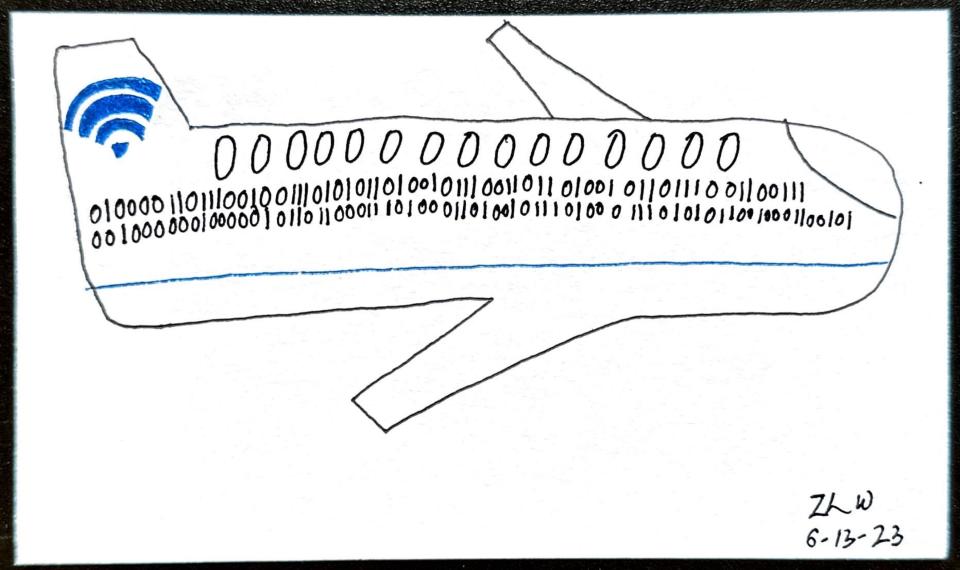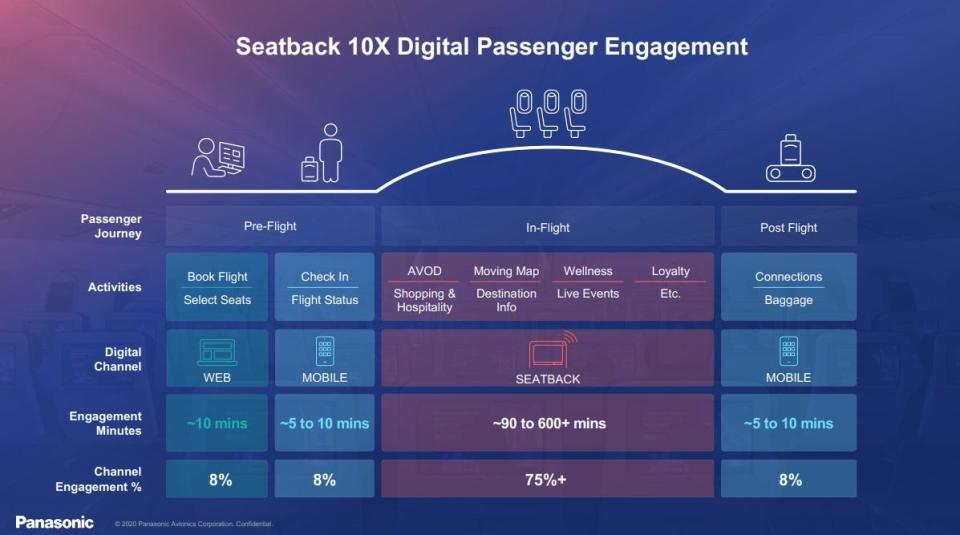Cruising Altitude: Airlines don't just want your money. Now they want more of your data.
The hottest new thing in air travel: data collection.
I spent most of last week in Hamburg, Germany, at the Aircraft Cabin Interiors Expo. It’s an annual trade show that allows airlines, airplane manufacturers and the makers of all kinds of internal plane components like seats, entertainment screens, catering carts and even toilets to show off and shop for their wares.
I definitely saw some cool, quirky stuff like an in-cabin wheelchair securement, which would allow disabled travelers to fly in their own mobility devices and a concept for double-decker economy seats.
But almost every booth I visited – from airplane manufacturer Airbus to inflight entertainment provider Panasonic – was talking about data collection. Seemingly every exhibitor had an app they were either offering or developing.
Coinciding with the trade show is the Crystal Cabin Awards, and this year’s winner in the passenger comfort category was the InteliSence system from Collins Aerospace. It’s a network of at-seat sensors that allows maintenance crews to quickly address problems on the plane, but it can also do things like track what you’re drinking and how full your glass is, according to Collins, meaning flight attendants on equipped planes could top you up more quickly without having to double-check what you were having in the first place.
All this tech talk gave me a kind of funny feeling.
Sure, I appreciate the convenience of checking in for flights on my phone, changing my seat assignment if a better location opens up without having to call the airline, or rebooking myself if my flight gets delayed or canceled. But do I really want a plane watching me drink my seltzer? Does anyone?

Do you want more tech on your flight?
During a media briefing, Panasonic executives said they’re working to make seatback screens that airlines can use to interact more directly with passengers.
“You are unique. You have a certain set of wants and desires,” Panasonic Avionics CEO Ken Sain said in an interview during the expo. “How else is an airline going to tailor that experience?”
A slide from the Panasonic media briefing shows that passengers can spend more than 600 minutes per journey interacting with seatback screens, compared to 30 minutes or less on other devices before and after their flight.

It’s a lot of potential data that aviation executives say they can be capitalizing on to make every traveler’s flight more personal.
But digital privacy experts worry about what could actually happen with all that data.
“It’s the same argument that Facebook makes: ‘We want to personalize the ads so that they’re relevant for you.’ ” India McKinney, director of federal affairs at the Electronic Frontier Foundation, told me. “As a privacy person, every time I hear that I kind of freak out.”
McKinney said data collection is often just a way for companies doing it to make more money, and that it rarely results in tangible improvements for consumers.
“The concern with any company that is going to a more digital system like that is data collection and data sale. Hoovering up as much data as you can and making a little bit more money off your customers,” she said. “They’ll say they want to personalize the customer experience, but does that mean you’ll make sure you know that you have a flight of people who prefer to drink tea instead of coffee? Are you going to stock more tea? Are you going to change what you put on the plane based on the data you collect?”
When Delta Air Lines started rolling out free Wi-Fi on many flights earlier this year, the only requirement to take advantage of the service was to enroll in its SkyMiles frequent flyer program. It’s another case of an airline promising a more personalized experience and relying on data collection to get there.
As Brett Snyder, author of the Cranky Flier blog, wrote at the time of the announcement, the upgrades are making Delta into a marketing machine.
“On the surface, this all sounds like a massive expense for Delta, and that is how the airline wants you to think about it. This is a generous offering from a premium airline, and you should spend your premium dollars to fly said airline. But this is not just about Delta throwing money out there magnanimously. This is about turning free wifi into a moneymaker through partnerships,” he wrote, adding that the requirement to open a SkyMiles account to get the perks for free “will really open up the revenue opportunities for Delta since it can tie your behavior throughout your journey to a single user.”
Last week's Cruising Altitude: What to know about inflight toxic fume incidents
McKinney said that’s in line with how other corporations use customer data, but it probably won’t ultimately mean much for travelers.
“What is this tradeoff that the airlines are talking about? Are you guaranteeing the overhead bin space above my seat? Are you making sure that your wifi works all the time? Are you making sure there’s enough food on the plane for the people who are going to want to buy food?” she said. “If you’re not doing those things, I don’t know what you’re offering me.”
And just what can you do to protect your data as airlines increasingly install and rely on tracking tech during your journey?
“The best way to protect yourself is to not fly. The best way to protect yourself is to never go on Facebook. To never go on Instagram. To never go on social media,” McKinney said.
You can also try to opt out, but let’s be honest: you won’t. Almost no one reads the terms and conditions for free wifi. You just want to get to your browsing faster.
“Nobody wants to live like that. It shouldn’t be on the traveler, it shouldn’t be on the consumer, it shouldn’t be on the individual to protect themselves,” McKinney said.
Advocates are pushing for stronger data privacy laws as technology becomes ever-more central to our lives, but in the meantime, it falls to the individual to try to guard their own data in cyberspace.
Zach Wichter is a travel reporter for USA TODAY based in New York. You can reach him at zwichter@usatoday.com
This article originally appeared on USA TODAY: Cruising Altitude: Why airlines want to collect more of your data

